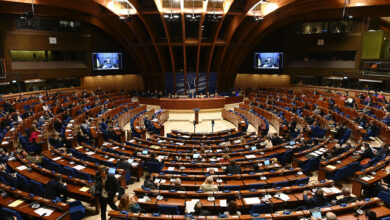US-allied Arab regimes remain wedded to a broad array of repressive laws that serve to undermine basic liberties, a leading Egyptian human-rights group declared Tuesday. In its second annual report, the Cairo Institute for Human Rights Studies (CIHRS)–one of the oldest rights watchdogs in the region–blames the ongoing deterioration of human rights and civil liberties in the Arab World on several factors.
One of these factors is the apparent lack of enthusiasm on the part of the US administration of Barack Obama to promote democratic reform in the region–a foreign-policy pillar of the previous George W. Bush administration.
Obama, the report states, "has avoided taking a clear stance on human rights issues in the Arab region."
Released to coincide with the upcoming 61st anniversary of the adoption of the Universal Declaration of Human Rights, the report details the human rights records of 12 Arab countries. It cites a variety of rights violations, ranging from torture and extra-judicial killing to assaults on rights activists and suppression of freedom of expression.
The 230-page report is critical of US State Secretary Hillary Clinton for her failure to address the issue during a "democracy promotion conference" with Arab counterparts in Morocco last month. "This provided a green light to Arab governments to continue these practices," said CIHRS director Bahey el-Din Hassan.
US officials, however, dismiss the charges.
In Washington, US State Department spokesman P.J. Crowley said he could not comment on the report’s findings since he had not read it. But he denied the claim that the Obama administration had abandoned the quest for improved human rights in the Arab world.
"We continue to sustain a significant human rights dialogue," said Crowley. "It’s a dimension of virtually every contact that we have with representatives of countries in the region and around the world."
The report, slated to be submitted Wednesday to the Geneva-based United Nations Human Rights Council, goes on to state that human rights have been further violated by "the growing tendency of regimes in some Arab countries to align themselves with Salafists, with the goal of mending their tattered political legitimacy in any way other than re-establishing it on the basis of the free democratic choice of their citizens.”
The CIHRS report further states that “human rights would be the first victim of this alliance, which is bound together by a religious discourse that is hostile to freedom of expression, thought and belief, minority and women’s rights.”
Salafism is a Sunni Islamic movement that takes the pious ancestors, or Salaf, of the patristic period of early Islam as exemplary models. Salafist groups preach strict adherence to the Quran and the sayings and deeds of Prophet Mohammed and his companions. In Egypt, the majority of Salafists shun politics, considering opposition to the temporal ruler a sin.
Last month, prominent Salafist preacher Sheikh Said Abdel Azim presented a "Salafist Initiative for Reform," in which he deemed all discussion of the "inheritance" of presidential power from father to son–a widely anticipated scenario in Egypt–as “irrelevant.” According to the initiative, democracy is a form of "heresy" since it might result in the election of "women or apostates."
Experts, meanwhile, express concern over the growing propensity of some Arab regimes to forge implicit alliances with Salafist groups to establish their religious credentials in the face of local political Islamist movements, which represent their most serious rivals. According to the CIHRS report, some Arab countries, among them Egypt and Morocco, have gone so far as to launch security crackdowns on anyone publicly breaking the fast during the Islamic holy month of Ramadan.
The report also states that the Egyptian security apparatus, along with some Muslim citizens, had "attacked Coptic [Christians] holding prayer services in their homes,” noting that some Christian street names had been gradually replaced by Islamic ones.
So-called "Failed States" have also contributed to the perpetuation of human rights violations in the Arab World, the report notes.
“Yemen appears to be in need of a miracle to stop its ongoing disintegration into a set of warring territories or descent into wholesale anarchy like Somalia,” it points out. The report goes on to state that the current fragmentation of Yemen reconfirms "the failure of counterterrorism strategies grounded solely in security considerations, which often lead to support for corrupt dictators as long as they can be helpful in the short term.”
Yemen is currently wracked by fierce fighting between the central authority and the insurgent Shia El-Houthi group in the north, amid heightened calls by southern Yemenis to break ties with the Sana’a government.
But the report singles out Egypt, Syria and Tunisia as the leading human-rights offenders, with Cairo said to lead the region in torture; Damascus in repressing rights activists; and Tunis in cracking down on political opposition.
“Egypt continued to top the list of countries in which torture is routinely and systematically practiced,” it states. “In 2009, Egyptian authorities used torture not only against those accused of political crimes or terrorism, but also against adherents of minority religions such as Shias, as well as suspects of criminal offences.”
Despite improving relations with the West since the advent of the Obama administration, meanwhile, the Syrian government of President Bashar Assad "continues to crack down at the slightest sign of [political] movement," the report notes. And in Tunisia, which the report describes as "a classic police state," President Zine el Ebiden Ben Ali recently secured a fifth term of office by "eliminating potential competitors and denying them candidacy."
Rights violators, the report goes on to point out, are seldom brought to account. "The single most worrying sign for the future of the Arab region is the widespread impunity and flagrant lack of accountability that persists," it states.
Religious and ethnic minorities also continue to suffer from discrimination in several Arab countries, the report notes, including Egypt and Saudi Arabia.
"Despite the Saudi regime’s attempt to appear to champion religious tolerance and interfaith dialogue in international forums," it states, "in practice, the national religious police continue to exhibit violent behavior."
The long-suffering Palestinian people, meanwhile, remain subject to a triad of abusers, according to the report, including Israel, the secular Fatah movement in control of the West Bank, and the Islamic Hamas movement that governs the Gaza Strip.
“Israel continued to engage in policies that violate international humanitarian law, illustrated particularly in the collective punishment of Palestinians in the Gaza Strip and the now two-year-old blockade,” the report states, describing Israel’s "Operation Cast Lead" assault on the Gaza Strip–which resulted in more than 1,400 Palestinian causalities–as “ the biggest massacres in the occupied territories since 1967.”
The Israeli attack also provided Hamas with an excuse to crack down on rival Fatah activists, the report continues.
“Under the cover of the war in Gaza, Hamas embarked on several repressive measures targeting Fatah members, figures who oppose Hamas rule and suspected collaborators with Israel," it states. "It is suspected that dozens of people were killed, either shot to death or as a result of torture.”
The Fatah movement, led by US-backed Palestinian Authority President Mahmoud Abbas, was also taken to task for committing numerous rights violations.
“In the West Bank, hundreds of Hamas sympathizers remain in detention. It is thought that at least two of the detainees have died as a result of torture," the report states. "The West Bank authorities fired civil servants and teachers suspected of Hamas sympathies."




